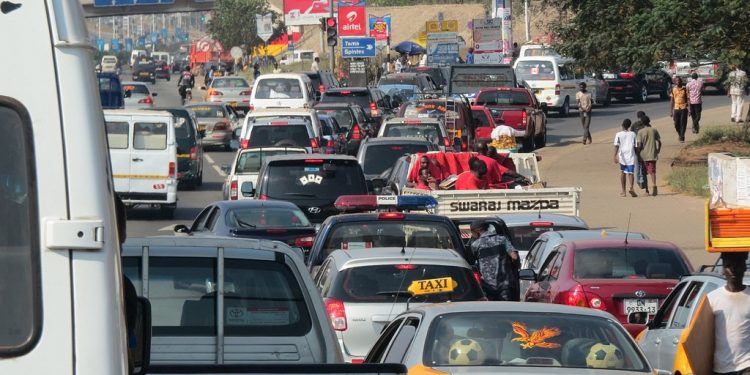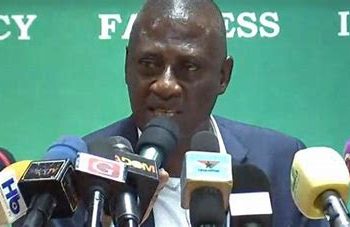Imagine being diagnosed with a health condition linked to the risks of one’s long and continuous stay in vehicular traffic. Unfortunately, this could be the unknown plight of commuters and other road users as they go about their daily activities.
While time and fuel wasted are counted as the economic cost of extremely slow traffic flow; many are simply unaware that sitting in traffic actually has significant negative health effects over time.
In this piece, I explore the public health impact of road traffic congestion and its potential mitigation measures.
For most Ghanaians who live in major cities like Accra, their livelihoods depend on their daily hustles. With a failing bus system, this means to a large extent, people are carried by a lot of vehicles to the major trading hubs.
In the end, most roads leading to these spots are inundated, causing several hours of gridlock.
“The traffic on the road is a major problem for us. We really suffer having to spend about two to three hours on the road”, a commercial driver who plies the Kpone Barrier-Dawhenya stretch of the Tema-Aflao road in the Greater Accra Region complained.
A teacher who accompanies his pupils to-and-fro school using the same street also told me, “It’s a very bad traffic situation especially in the mornings and evenings. When we close, we spend about 35 minutes at this particular junction.”
First, overcrowding on road networks amidst traffic noise could potentially lead to post-traumatic stress disorder and other pedestrian dangers. This thereby adversely affects the psycho-social wellbeing of the individual.
“The traffic noise potentially affects hearing. A lot of the effects are also psychological which cause stress and other cardiovascular diseases to passengers and pedestrians. These motorbikes that also run in-between the heavy traffic pose a lot of danger to pedestrians”, Public Health Physician, Dr. Mary Amoakoh-Coleman disclosed.
Beyond the apparent loss of time and outrageous fuel consumption, staying through traffic for long hours has latent health implications, often swept under the carpet.
But what could these health implications really be? That’s a question I posed to Dr. Reginald Quansah, a senior lecturer at the Department of Biological, Environmental and Occupational Health of the School of Public Health at the University of Ghana.
“The fuel cars use is a chemical. So, in a situation where the cars are in congestion and moving slowly, there are emissions. Some of the emissions that the cars release when moving contain a lot of cancer-causing agents”, he said.
I visited Accra Central, a commercial hub in Ghana around midday. It was rush hour and as brisk business went on, there were those who found the stream of traffic unbearable.
Out of frustration and discomfort amidst the observance of the COVID-19 safety protocols in the vehicles, they were compelled to alight and continue their journey by foot.
“I’m working with time. I will waste about an hour if I stay in this traffic, so I have to get down and continue the journey”, a commuter stated.
More worrying about the situation is the toxic emissions which have been identified as major ecological pollutants attributable to traffic congestion.
These toxins are said to have some morbidity effects including cardiovascular and respiratory ailments in the long term. The physical contaminants may shorten the lives of pedestrians, passengers and even vehicle owners.
Dr. Reginald Quansah, who specializes in Environmental and Occupational Health maintained that the major concern for him as a public health analyst will be the safety and lives of street hawkers, people living close to roads, school children, pregnant women, elderly people, street beggars and the poor since they are at high risk of traffic noise and pollution exposures.
Controllers of the menace
City authorities have over the years been helping the traffic situation. One of the mandated agencies is the Ghana Police Service. Personnel of its Motor Traffic and Transport Department (MTTD) as part of their official mandate are responsible for controlling traffic and enforcing traffic regulations.
Commanding Officer of the MTTD in Accra, DCOP Martin Ayiih in an interview mentioned that “the challenge is how to allow people move to their destinations because a lot of vehicles are coming unto the road, but the road infrastructure is not expanding.”
But are the officers who even direct traffic concerned about their health and safety while in line of duty? Yes, they are. DCOP Martin Ayiih admitted the job has its fair share of the associated health risks of traffic management.
“Normally it’s safety for all but, we don’t talk about the safety of the traffic policeman. The sun and noise affect us. That is our occupational hazard because this is what we have chosen to do.”
The Weija-Kasoa toll booth is also one of the major traffic zones in the capital. The stretch which links Accra to the Central and Western Regions is mostly choked both in the mornings and evenings.
On weekends, in particular, there is heavy congestion on the road due to people travelling to the other regions; some for funeral activities. Many of the passengers who use the route are persons who commute from the other side of town to the Central Business District.
Lamenting the daily routine of having to endure the commuter-traffic challenges, one private vehicle owner decried indicating, “This traffic in terms of productivity and convenience is frustrating. If the smoke from the exhaust pipes of vehicles has an effect like the Coronavirus, those of us using this road would have overwhelmed the health facilities by now”.
Transport and Traffic Modelling
How can the situation be managed properly to reduce the adverse health effects associated with the traffic volumes? There is a lot of public discourse on how to ensure the free flow of traffic on the roads of major cities in Ghana.
Dr. Evans Ago Tetteh is a lecturer in transportation planning and management at the Regional Maritime University. He shared with me, decisions and control strategies for urban traffic demand models with the health and safety of the ordinary road user in mind.
“We need to make proper use of the road infrastructure that we have to reduce traffic by more than 40 per cent. There should be flexible adjustments of routes during peak periods and also have dedicated lanes for our Bus Rapid Transport (BRT) system.”
However, as a developing country like Ghana that has done very little in the transportation sector, what can authorities and stakeholders do to address the situation in the long term?
“In all of this, we need to make sure that multi-modal transport such as railway works to help the situation”, Dr. Tetteh who has expertise in transport modelling suggested.
It is practically impossible to run away from the reality of vehicular movement should traffic peak while moving from one place to another. The long-term health effect cannot be underestimated.
Doctors are however advising on some steps individuals could be taking to ensure their utmost health and safety as they face this major problem.
Public Health Physician and member of the Ghana Medical Association, Dr. Mary Amoakoh-Coleman proffers some health tips to reduce the incremental risk and the chances of being harmed by traffic congestion.
“Policy-wise, we have to make sure that vehicles on our roads are good enough. The individual should strategically leave home early and return at a time to avoid traffic exposures.”
“I encourage the use of the face mask. It does not only prevent COVID-19 but also reduces air pollutants. One can use earplugs to reduce noise levels. Some particles settle on the skin, so there should be regular bathing to enhance hygiene”, she added.
Now, having to deal with traffic continues to be a major concern for most road users. Many of whom are essential service providers, workers and even students.
There are a lot of conversations about the economic implication of traffic congestion. Little, is however being said about the health impact of same both to the individual and the community at large.
A cursory evaluation of the economic and health impacts of traffic volumes in the mean time seems the latter is much more manageable.
Therefore, the government and other relevant bodies within the areas of transport and health must take giant steps and make significant provisions for tackling the public health burden of congestion on our roads.
—
The writer, Nii Larte Lartey, works with Citi FM, Citi TV and citinewsroom.com















